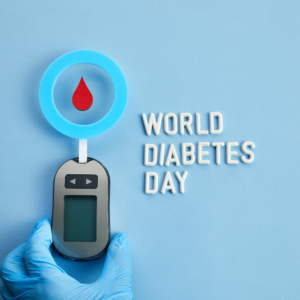World Diabetes Day 2023 – Driving Awareness – Diabetes and the HGV Driver

Every year on 14th November, World Diabetes Day is observed. The objective is to raise awareness around diabetes and promote support for sufferers around the world. In 2023 the focus is on access to Diabetes Care.
The date was chosen to coincide with the birthday of Sir Frederick Banting, who, along with Charles Best, played a key role in the discovery of insulin, a life-saving treatment for diabetes (1922).
What is Diabetes?
Diabetes is a condition that occurs when your blood sugar (glucose) is too high – caused by your pancreas not producing enough insulin (or none at all). Glucose mainly comes from carbohydrates in food and drink, and is your body’s “go to” source of energy.
The most common forms of diabetes are;
Type 2 – where the body doesn’t make enough insulin and/or cells don’t respond normally to insulin. This can often be treated by changes in diet and lifestyle.
Type 1 – an autoimmune disease where your body attacks and destroys insulin producing cells in the pancreas for unknown reasons. This is a chronic (permanent) condition and can be managed by insulin and close monitoring. Type 1 accounts for approximately 10% of diabetes sufferers.
Important symptoms to watch out for pre-diabetes:
- Increased thirst
- Frequent urination
- Fatigue
- Blurred vision
- Unexplained weight loss
If you experience any of the above you should speak to your GP – a simple test can identify any potential issues very early on.
Either form of diabetes can be controlled, but if left untreated can lead to complications including low (hypoglycemia) and high (hyperglycemia) – extremes of blood glucose levels can cause blurred vision, clumsiness, disorientation/confusion and seizures. These are of particular danger to drivers of all vehicles so awareness of symptoms and early testing is vitally important.
What if I have Diabetes?
Following any diagnosis, it is critical that the condition is well monitored and controlled. Long term complications can include:
- Nerve damage – which causes numbness, tingling and/or pain
- Nephropathy – which can lead to kidney failure
- Retinopathy – which can lead to blindness
- Diabetes related foot conditions
Driving and Diabetes
For drivers (and HGV drivers in particular) it is vitally important to have regular medical check-ups both before and after any diagnosis of diabetes. Some key tips for looking after yourself (they may seem obvious, but they’re often the first things that are overlooked…)
- Hydration – stay well hydrated, as dehydration can affect blood sugar levels. The moment you feel thirsty, you are already dehydrated!
- Healthy eating – plan your meals to include a balanced mix of carbs, proteins and fats. Avoid sugary foods and opt for complex carbohydrates that release glucose more slowly.
- Physical Activity – incorporate physical activity into your routine. Even short walks or stretching exercises during breaks can be beneficial.
- Rest and sleep – ensure you get enough rest and quality sleep.
- Regular health check-ups – to accurately monitor either pre-diabetic symptoms or actual diabetes management.
HGV drivers are uniquely at risk of diabetes – the job often involves long periods in a static position, eating “on the go” convenience foods, and generally not having the opportunity to exercise/relax properly. Stress can also be a contributary factor to developing diabetes, so it is important to try and mitigate this in your job where possible.
Even the key symptoms like fatigue, thirst, and frequent urination are not “suspicious” on their own given the lifestyle many drivers have. You don’t sleep – you’re tired. You’re thirsty a lot – you drink a lot – you go to the loo a lot!
Any diagnosis of a health condition can feel devastating, but the objective of World Diabetes Day is to help increase awareness and strip away some of the misconceptions. Though a serious condition, it is possible with proper diagnosis and monitoring to live full, healthy lives.
Though his achievements may be beyond most of us, Sir Steve Redgrave (5 Olympic Gold medal winner) was diagnosed with Type 2 diabetes in 1997 and still went on to win his 5th Gold in Sydney 2000.
Drivers – look after yourselves. And if you do ever get a diagnosis of diabetes? Make sure that you control the condition – don’t let the condition control you.
Tony Curran
